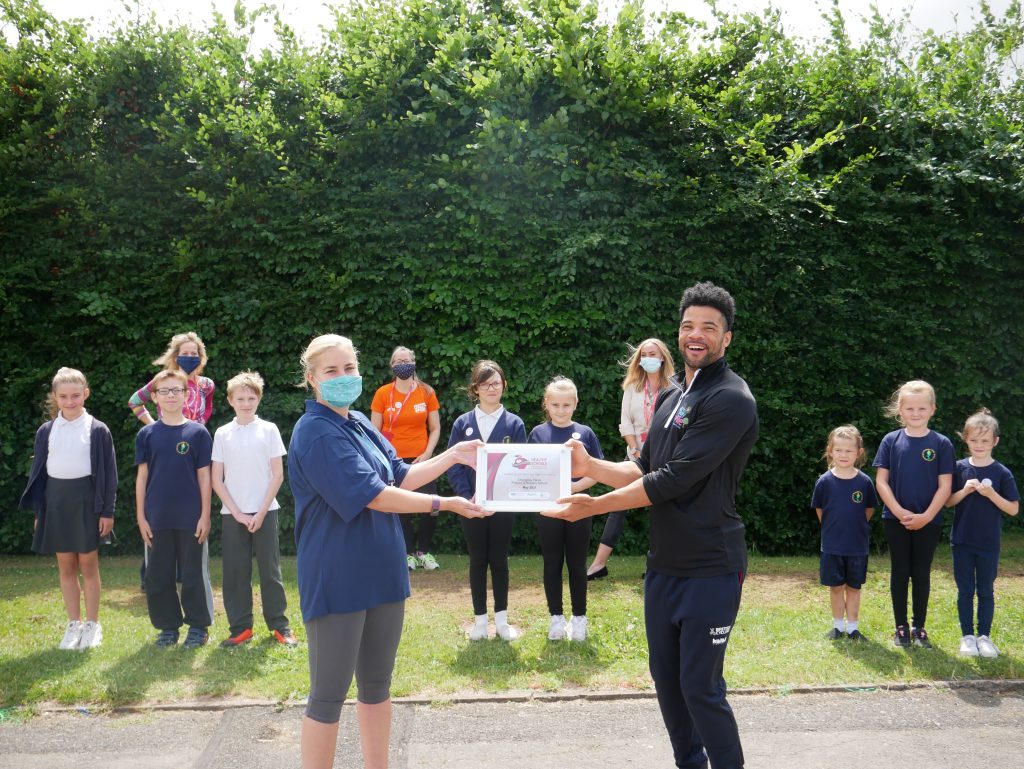The Healthy Schools accreditation process has helped to guide our school’s vision for a better, healthier world. It helped to identify opportunities for staff to further their professional development, for example in relation to mental health and the links between that and so many areas of school and daily life. School leaders worked together to formulate an action plan to address these needs in order to better support our children and families.

The sharing of milestones, achievements and key messages in relation to our Healthy Schools development has helped to ensure parents and carers and our wider school community are involved at every step of the journey. Regular updates have been shared in our school newsletters, our school website and in conversations with parents and other members of our community.
One of the most helpful parts of the process has been the opportunity to work in partnership with a range of external agencies and services. Being able to draw upon their knowledge, expertise and resources has supported our school’s development throughout the accreditation process.
As a result of completing the Healthy School accreditation, our pupils have developed a much better understanding of the importance of physical activity, healthy eating, mental health and well-being, alongside improvements in resilience and the ability to keep themselves and others safe.
Our whole school community is committed to actively encouraging children to grow as kind, compassionate people who are confident and resilient, working to their potential and both physically and mentally healthy.
Starting Out
1. Why did the school decide to pursue the Cambridgeshire and Peterborough Healthy Schools Award?
In order to improve practise within our school and as a continuation of developing Thongsley Fields Primary and Nursery schools provision to its pupils and wider community.
2. Was the initial step of completing the online audit of 30 Yes/No questions a suitable starting point? Was it achievable within the stated 15 minutes?
The initial step of completing the audit was a simple process and enabled myself as lead to develop a clear action plan which could be shared with the wider staff team.
3. Was the online audit a useful tool in providing a quick assessment of the key points of action to take?
Yes
4. How beneficial was the opportunity to follow up the completion of the audit with an informal, virtual meeting with a member of the Healthy Schools team?
The virtual meeting with Joanne was really useful. She was able to share resources that supported our development further and clarified any questions that I had.
The Journey Towards Accreditation
5. Having achieved an initial assessment of the key actions to take, did the provision of the more detailed point score document for the award help to structure the approach taken by the school?
Yes, I was able to ensure policies that were not in place could be written, reviewed with the staff team and wider community and then approved by governors in order to meet the required point score.
6. What decisions were taken by the school to make progress against the standards and did the majority of the staff – teaching as well as non-teaching – get involved?
All staff became involved as we were working collectively towards a common goal. Decisions were taken at first to have the most impact on pupils.
7. Did the accreditation framework encourage a whole school approach to embedding a consistent and progressive health agenda?
Yes – it led to staff CPD and the mental health competency framework questionnaire ensured that needs of the whole school were being addressed and met.
8. Was the point score document useful in both identifying evidence and monitoring progress and was the process of evidencing the standards manageable?
Yes, the point scoring was positive at first as it provided the opportunity to celebrate with staff what we were already doing within our practise but was not formally recognised between us before undertaking the point scoring audit. It then made the progress steps more manageable and gave a clear framework for monitoring.
The Destination
9. What are the key benefits for the school having completed the accreditation journey?
Thongsley Fields Primary and Nursery school is able to celebrate success that may not be linked to academic achievement but have huge benefits for our pupils. It raised the profile of ‘health’ education within the school in all forms.
10. Do you consider the work undertaken to have had an impact and do you consider this will be maintained and therefore long-lasting?
There has been a positive impact on staff cpd, pupils’ experiences within school and I feel this will be maintained and long-lasting.
11. In view of the recent changes to the Ofsted inspection Handbook and the inclusion of the following point:
“From the start of the summer term 2021, how a school meets the expectations of the DfE’s statutory guidance on relationships education, relationships and sex education and health education will contribute to the leadership and management judgement.” how relevant do you consider the standards of the award to be?
I feel this award’s standards directly link to the Ofsted inspection handbook and will be used as evidence towards meeting these expectations.
12. Would you recommend the Healthy Schools Award to other schools, if so why?
Yes – it has a direct positive impact on all members of our school community.


